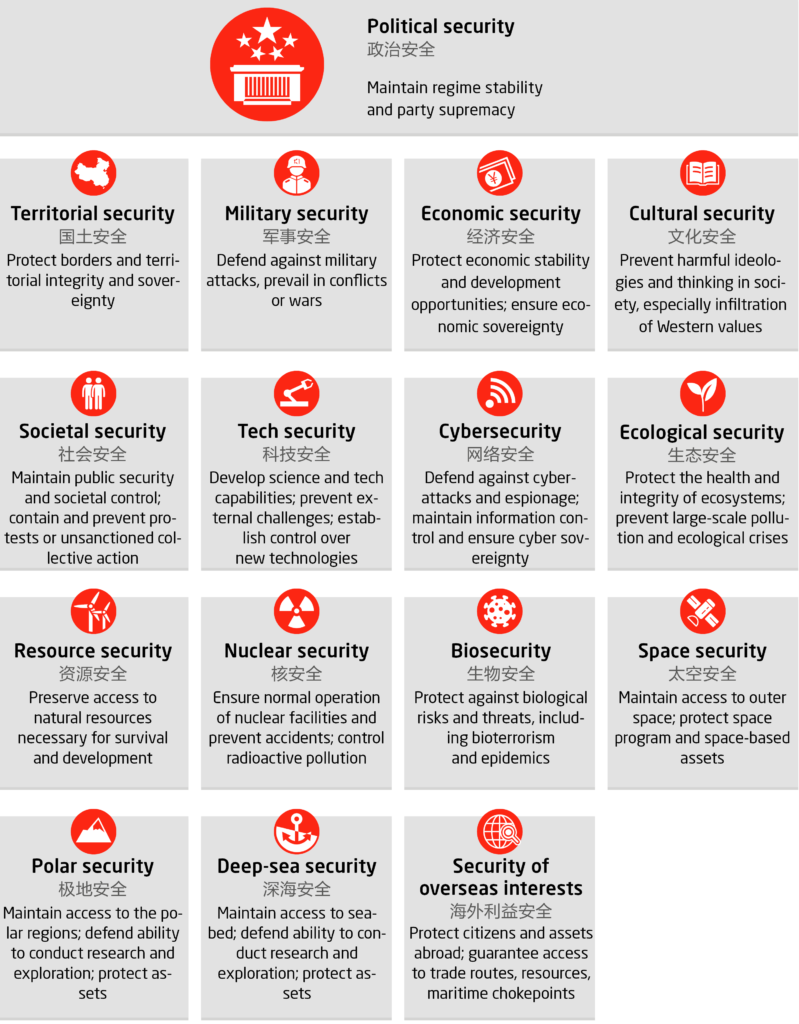Xi Tightens Grip on Chinese in Name of ‘Comprehensive National Security’
A new report highlights an ominous strategy taking shape as the Chinese Communist Party primes the country to be on the lookout for threats.

President Xi, in a development sketched in a new report, is sharply expanding the Communist Party’s grip on the world’s most populous country in the name of “Comprehensive National Security.”
The new study, issued by the Mercator Institute for Chinese Studies, reports that Mr. Xi has added five new areas to be controlled for “national security” purposes to the original 11 announced in 2014. They include cybersecurity, maritime security, and the security of China’s overseas interests.

These developments suggest Mr. Xi, a Communist Party boss who already runs one of the world’s most totalitarian regimes, is pursuing even tighter control as he prepares for a third five-year term in office. His strategy is articulated in almost Orwellian terms, and comes amid growing tensions between China and the West.
“The CCP believes threats are at an all-time high and that China’s ability to maintain national security is still insufficient,” the Merics report suggests.
The concept of “comprehensive national security,” the Merics report explains, is not new in and of itself.
It has been a mainstay of Chinese Communist Party thinking dating back to the foundation of the people’s republic in 1949. The term, and the CCP, may have shifted focus from “traditional to non-traditional security,” the report argues, but the goal has remained the same: maintaining the CCP’s legitimacy and power.
Mao Zedong was focused on “territorial and military security.” It was after the Tiananmen Square protests that “cultural or ideological security” became a focus. It was Hu Jintao, the party boss in the decade between 2002 and 2012, who, in response to protests over pollution, added “ecological and resource security.”
What Mr. Xi is doing, the report argues, is intensifying the focus on “national security” overall, combining “internal and external security concerns” to deal with “fears of greater global and domestic instability.”
His special focus, Merics says, has been on information and ideological control, technological security, military and territorial security, and “preempting networked resistance.”
Mr. Xi’s leadership has also brought the explosion of national security-related laws, the report notes. It lists the national security and counter-terrorism laws of 2015, the counter-espionage law of 2014, the cyber security law of 2016, the law to manage foreign non-governmental organizations, the national intelligence law of 2017, the data security law of 2021, and Hong Kong’s all-encompassing national security law in 2020.
The goal — and result — is comprehensive control by the Chinese Communist Party for the sake of “security.”
This is manifested in “crackdowns against groups bound by ethnicity, language, religion, or common causes,” from the Uyghurs in Xinjiang to activists of all stripes on issues stretching from labor to consumer and LGBTQI+ rights.
It also manifests in campaigns to “promote a unified national identity (国家认同)” and “correct” mainstream values, and in the slow death of minority languages.
Mr. Xi has even demanded a “comprehensive national security outlook in religious affairs to ensure that religious organs promote CCP core values and policies.” A “roadmap to integrate national security in curricula was released in 2020,” and is being implemented.
The drive for “national security” has also included increasing control of the internet. “Whereas in the early 2010s,” the report details, “public incidents and scandals were often followed by weeks of critical discussion, now online spaces are quickly censored and flooded by messages supportive of the party within hours.”
Mr. Xi’s “all-encompassing national security mindset,” Merics concludes, “is increasingly locking China into certain modes of action. By priming officials and citizens alike to be on the constant lookout for potential new threats, and thus increasing the risks of overreactions and arbitrariness, pragmatism has given way to ideology.”
“No amount of engagement or cajoling will lead to Beijing shifting away from this security-focused, illiberal trajectory, short of major internal rethinking and reforms,” Merics adds. It does suggest that “domestic criticism” discloses that “this approach is not uncontested. Not everybody is an ardent defender of the concept, and many may want to maintain China’s room for action.”
“Party-state actors are still assessing the costs to China’s economic development and international standing. Foreign actors can seek to change the party’s calculations by communicating concerns and raising the costs for harmful behaviors through coordinated, targeted responses,” the Merics report says.

